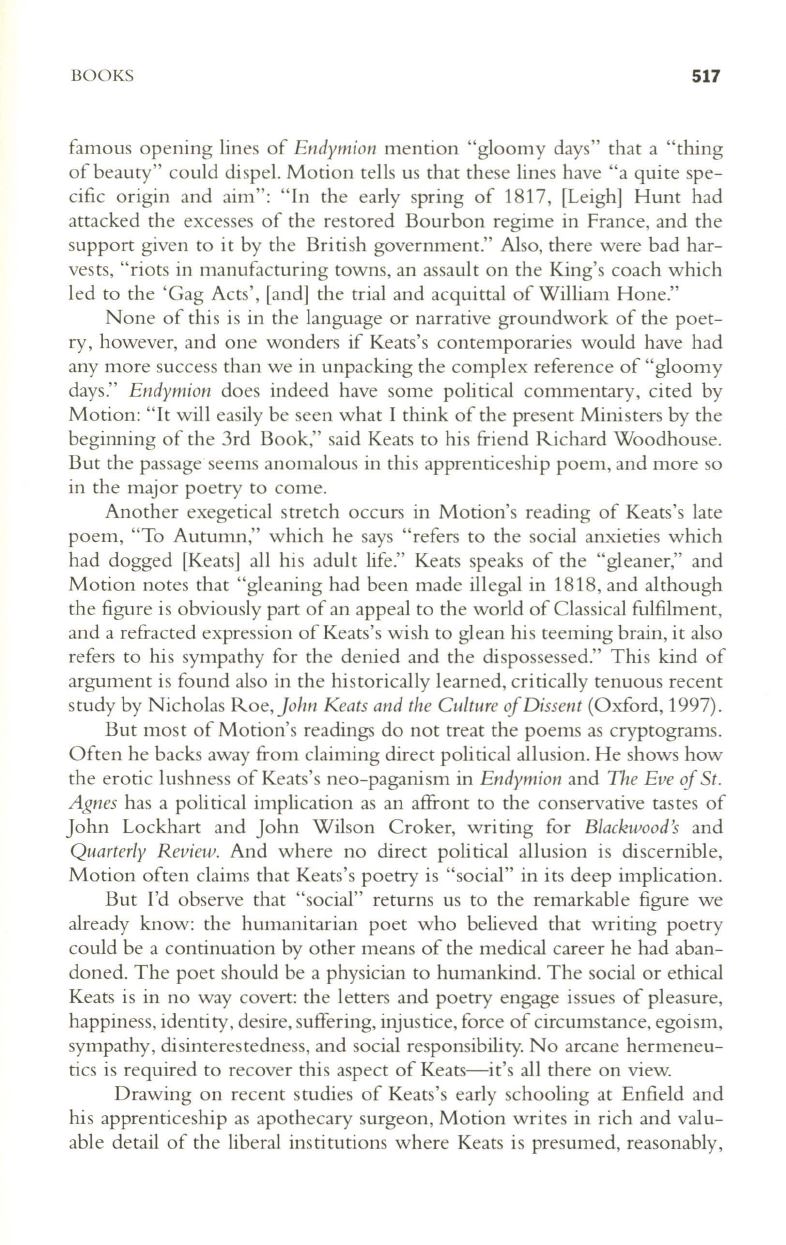
BOOKS
517
famous opening lines of
Endymion
mention "gloomy days" that a "thing
of beauty" could dispel. Motion tells us that these lines have "a quite spe–
cific origin and aim": "In the early spring of 1817, [Leigh] Hunt had
attacked the excesses of the restored Bourbon regime in France, and the
support given to it by the British government."
Also,
there were bad har–
vests, "riots in manufacturing towns, an assault on the King's coach which
led to the 'Gag Acts', [and] the trial and acquittal of William Hone."
None of this is in the language or narrative groundwork of the poet–
ry, however, and one wonders if Keats's contemporaries would have had
any more success than we in unpacking the complex reference of "gloomy
days."
Endymion
does indeed have some political commentary, cited by
Motion: "It will easily be seen what I think of the present Ministers by the
beginning of the 3rd Book," said Keats to his friend Richard Woodhouse.
But the passage seems anomalous in this apprenticeship poem, and more so
in the major poetry to come.
Another exegetical stretch occurs in Motion's reading of Keats's late
poem, "To Autumn," which he says "refers to the social anxieties which
had dogged [Keats] all his adult life." Keats speaks of the "gleaner," and
Motion notes that "gleaning had been made illegal in 1818, and although
the figure is obviously part of an appeal to the world of Classical fulfilment,
and a refracted expression of Keats's wish to glean his teeming brain, it also
refers to his sympathy for the denied and the dispossessed." This kind of
argument is found also in the historically learned, critically tenuous recent
study by Nicholas Roe,
John Keats and the Culture oJDissent
(Oxford, 1997).
But most of Motion's readings do not treat the poems as cryptograms.
Often he backs away from claiming direct political allusion. He shows how
the erotic lushness of Keats's neo-paganism in
Endymion
and
The Eve
of
St.
Agnes
has a political implication as an affront to the conservative tastes of
John Lockhart and John Wilson Croker, writing for
Blackwood's
and
Quarterly Review.
And where no direct political allusion is discernible,
Motion often claims that Keats's poetry is "social" in its deep implication.
But I'd observe that "social" returns us to the remarkable figure we
already know: the humanitarian poet who believed that writing poetry
could be a continuation by other means of the medical career he had aban–
doned. The poet should be a physician to humankind. The social or ethical
Keats is in no way covert: the letters and poetry engage issues of pleasure,
happiness, identity, desire, suffering, injustice, force of circumstance, egoism,
sympathy, disinterestedness, and social responsibility. No arcane hermeneu–
tics is required to recover this aspect of Keats-it's all there on view.
Drawing on recent studies of Keats's early schooling at Enfield and
his apprenticeship as apothecary surgeon, Motion writes in rich and valu–
able detail of the liberal institutions where Keats is presumed, reasonably,


